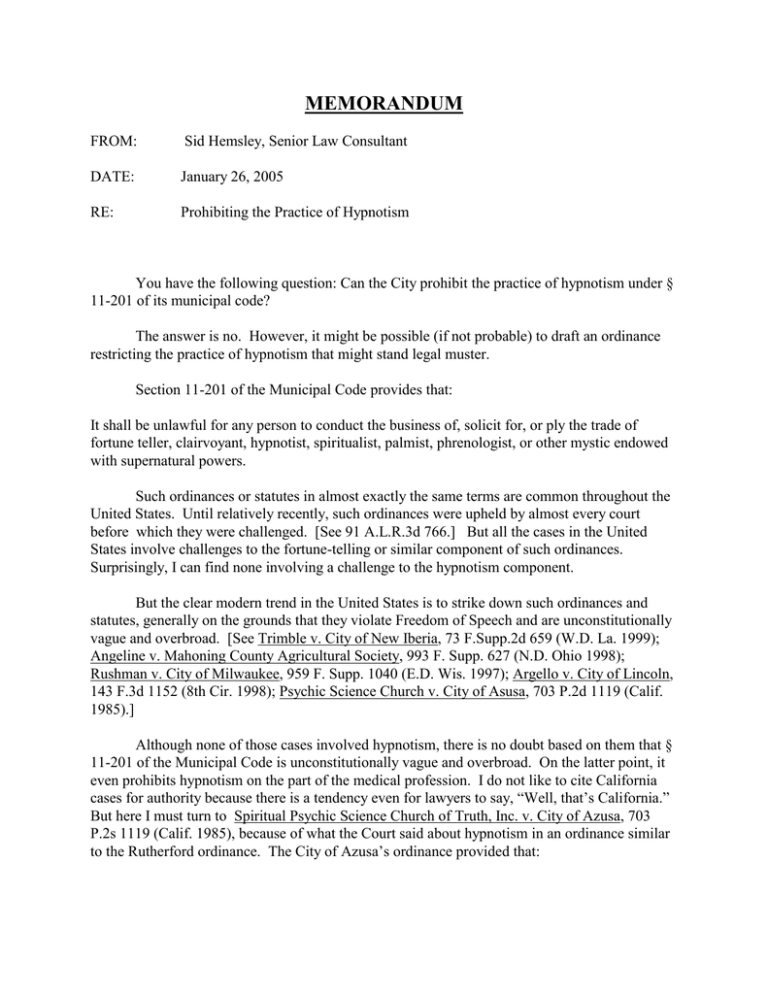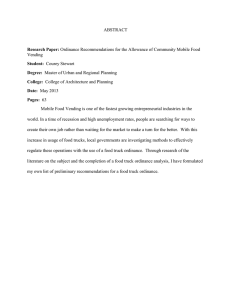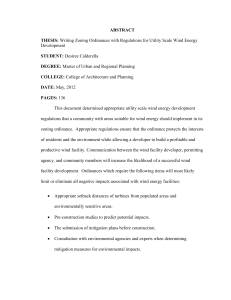MEMORANDUM
advertisement

MEMORANDUM FROM: Sid Hemsley, Senior Law Consultant DATE: January 26, 2005 RE: Prohibiting the Practice of Hypnotism You have the following question: Can the City prohibit the practice of hypnotism under § 11-201 of its municipal code? The answer is no. However, it might be possible (if not probable) to draft an ordinance restricting the practice of hypnotism that might stand legal muster. Section 11-201 of the Municipal Code provides that: It shall be unlawful for any person to conduct the business of, solicit for, or ply the trade of fortune teller, clairvoyant, hypnotist, spiritualist, palmist, phrenologist, or other mystic endowed with supernatural powers. Such ordinances or statutes in almost exactly the same terms are common throughout the United States. Until relatively recently, such ordinances were upheld by almost every court before which they were challenged. [See 91 A.L.R.3d 766.] But all the cases in the United States involve challenges to the fortune-telling or similar component of such ordinances. Surprisingly, I can find none involving a challenge to the hypnotism component. But the clear modern trend in the United States is to strike down such ordinances and statutes, generally on the grounds that they violate Freedom of Speech and are unconstitutionally vague and overbroad. [See Trimble v. City of New Iberia, 73 F.Supp.2d 659 (W.D. La. 1999); Angeline v. Mahoning County Agricultural Society, 993 F. Supp. 627 (N.D. Ohio 1998); Rushman v. City of Milwaukee, 959 F. Supp. 1040 (E.D. Wis. 1997); Argello v. City of Lincoln, 143 F.3d 1152 (8th Cir. 1998); Psychic Science Church v. City of Asusa, 703 P.2d 1119 (Calif. 1985).] Although none of those cases involved hypnotism, there is no doubt based on them that § 11-201 of the Municipal Code is unconstitutionally vague and overbroad. On the latter point, it even prohibits hypnotism on the part of the medical profession. I do not like to cite California cases for authority because there is a tendency even for lawyers to say, “Well, that’s California.” But here I must turn to Spiritual Psychic Science Church of Truth, Inc. v. City of Azusa, 703 P.2s 1119 (Calif. 1985), because of what the Court said about hypnotism in an ordinance similar to the Rutherford ordinance. The City of Azusa’s ordinance provided that: No person shall practice or engage in the business or art of astrology, augury, card or tea reading, cartomancy, clairvoyance, crystalizing, divination, fortune telling, hypnotism, magic, mediumship, necromancy, palmistry, phrenology, prophecy, or spiritual reading, or similar business or art, who either solicits or receives a gift or fee or other consideration for such practice, or where admission is charged for such practice. [At ] In that case, the person violating the ordinance was charged with fortune telling, but in striking down the entire statute, the Court said this about the prohibition on the various practices prohibited by the ordinance, including hypnotism: The City assures us that the ordinance is aimed only at communications that purport to predict future events. Assuming that such a bad would be permissible, however, the ordinance contains no words to this effect. Thus the prohibition against “spiritual reading” would encompass Bible lessons, the bar against “hypnotism” could include hypnosis as an accepted technique of the psychotherapist, the banning of “magic” could prevent numerous popular theatrical performances, and the prohibition against “prophecy” could interfere with many religious services. The ordinance is clearly overbroad, applying to many activities that are protected by the California Constitution. [At All of the above cases support the same conclusion with respect to the your ordinance. In fact, the municipal ordinance is even more overbroad than was the Azusa City ordinance. The former’s prohibition on the listed activities is total; the latter’s is restricted to situations where the practitioner receives a gift or fee or other consideration. That does not necessarily mean that an ordinance restricting–rather than prohibiting–the practice of hypnotism would not be upheld. However, at the moment I am not sure that is true. Hypnotism might receive from the courts the same Freedom of Speech protection that has been accorded fortune-telling and similar activities under the modern cases noted above. The municipal ordinance prohibiting hypnotism is unquestionably defective and does not stand a remote chance of being upheld. I am not confident that one can be written that would be upheld, but I would like to do more research on that question, even thought I have already spent a great deal of time on it.


